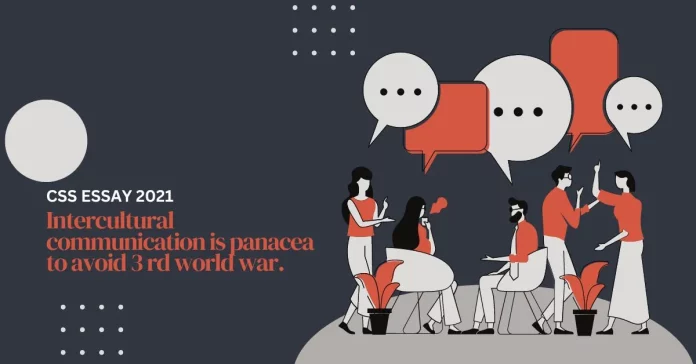Table of Contents
Thesis statement
Intercultural communication plays a crucial role in preventing a third world war by promoting understanding, empathy, and collaboration among nations.
Introduction
In an increasingly interconnected and globalized world, the need for effective intercultural communication has become more critical than ever. The potential consequences of miscommunication, misunderstandings, and conflicts among nations have raised concerns about the possibility of a third world war. However, by fostering understanding, empathy, and collaboration, intercultural communication can serve as a powerful tool to prevent such a catastrophic event. In this essay we explore the role of intercultural communication in avoiding a third world war, highlighting its significance in promoting peace, resolving conflicts, and building stronger international relations.
Exposition: Understanding Intercultural Communication
Intercultural communication can be defined as the exchange of information, ideas, and values between individuals or groups from different cultural backgrounds. It involves understanding and navigating cultural differences, such as language, customs, beliefs, and social norms. In a globalized world where people from diverse cultures interact on a daily basis, intercultural communication has become a crucial skill for effective collaboration and cooperation.
Effective intercultural communication requires cultural sensitivity, open-mindedness, and the willingness to learn about and appreciate different cultures. It involves active listening, empathy, and the ability to adapt communication styles to ensure mutual understanding. By recognizing and valuing cultural differences, individuals and nations can bridge gaps, promote inclusivity, and prevent conflicts that could potentially escalate into a world war.
Description: The Threat of a Third World War
The world has witnessed the devastating consequences of two world wars, which resulted in immense loss of life, destruction, and suffering. The lingering threat of a third world war looms over global society due to various factors. These include geopolitical tensions, territorial disputes, ideological differences, and the proliferation of weapons of mass destruction. In this context, effective communication becomes imperative in mitigating misunderstandings, defusing tensions, and promoting peaceful resolutions.
One significant challenge to international peace is the lack of communication and understanding among nations. Misinterpretation of intentions, stereotypes, and prejudices can escalate minor disagreements into full-blown conflicts. Moreover, cultural differences and language barriers often impede effective dialogue and compromise, leading to further polarization and animosity between nations. To avoid the catastrophic consequences of another world war, it is essential to prioritize intercultural communication as a means to prevent misunderstandings and promote peaceful coexistence.
Argumentation: The Power of Intercultural Communication in Conflict Prevention
Intercultural communication plays a pivotal role in conflict prevention by fostering understanding, empathy, and collaboration among nations. By cultivating a mindset of cultural sensitivity and embracing diverse perspectives, nations can build mutual trust and respect. Through effective intercultural communication, conflicts can be addressed proactively, and potential crises can be averted. The following points highlight the significance of intercultural communication in conflict prevention:
Fostering understanding and empathy among nations: Intercultural communication facilitates the exchange of ideas, values, and experiences, enabling nations to gain a deeper understanding of each other’s perspectives. This understanding promotes empathy and reduces the likelihood of misinterpretations and hostile actions.
Promoting peaceful resolutions through dialogue and negotiation: Effective intercultural communication enables nations to engage in constructive dialogue, negotiation, and diplomacy. By listening to one another, finding common ground, and exploring win-win solutions, conflicts can be resolved without resorting to violence.
Building trust and collaboration among diverse cultures and societies: Intercultural communication fosters trust and cooperation by breaking down barriers and building bridges between nations. By appreciating cultural diversity and recognizing the benefits of collaboration, countries can work together on global challenges, such as climate change, terrorism, and poverty.
Case Studies: Examples of Intercultural Communication in Conflict Resolution
Numerous case studies demonstrate the power of intercultural communication in conflict resolution. One prominent example is the diplomatic efforts between the United States and Cuba, which led to the normalization of relations in 2015. Through dialogue, negotiations, and cultural exchange, the two nations were able to overcome decades of hostility and work towards mutual understanding and cooperation.
Similarly, multilateral organizations like the United Nations and regional bodies such as the European Union play a vital role in promoting intercultural communication and conflict prevention. These organizations facilitate dialogue, mediate disputes, and provide platforms for nations to engage in peaceful negotiations.
Additionally, there are instances where effective intercultural communication has successfully prevented conflicts from escalating into full-scale wars. Diplomatic dialogues, cultural exchanges, and citizen diplomacy initiatives have been instrumental in easing tensions between nations and preventing potential conflicts.
Narration: Personal Experiences and Testimonials
Personal experiences and testimonials further highlight the importance of intercultural communication in conflict prevention. Individuals who have engaged in cross-cultural interactions often report transformative experiences, wherein prejudices and stereotypes are challenged, and meaningful connections are formed. By sharing stories of personal growth, understanding, and friendship, we can inspire others to embrace intercultural communication as a means to avoid conflicts and promote peace.
Conclusion
In a world threatened by the possibility of a third world war, intercultural communication emerges as a panacea for conflict prevention. By promoting understanding, empathy, and collaboration among nations, intercultural communication breaks down barriers and builds bridges between cultures. Through effective dialogue, negotiation, and cultural exchange, conflicts can be resolved peacefully. It is crucial for governments, organizations, and individuals to prioritize intercultural communication as a means to avoid the catastrophic consequences of another world war. By doing so, we can create a future where diversity is celebrated, understanding is valued, and conflicts are resolved through peaceful means.


